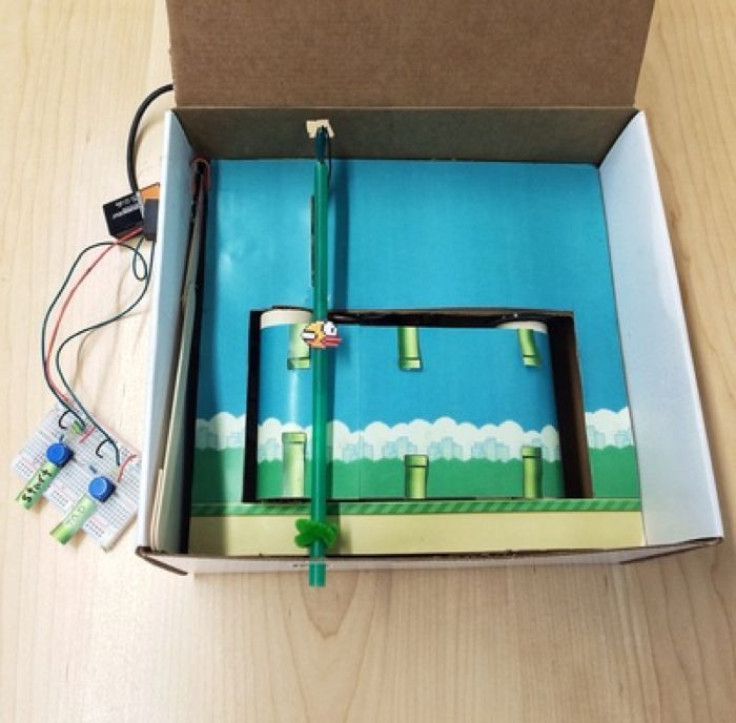'Flappy Bird' Game Deleted: Real Life Version Just As Frustrating [VIDEO]
You don't need the app to enjoy the game anymore.

"Flappy Bird" may no longer be available for download in smartphone app stores, but thanks to dedicated fan Fawn Qiu, a real-life version is now available to take up more of your free time. Qiu created the machine during a weekend hackathon hosted by the Tribeca Film Festival.
This cardboard device was comprised of an Arduino, which is a single-board microcontroller, two servo motors, a reed switch and magnets. Qiu posted a video of the device on YouTube, which has received nearly 90,000 views.
<iframe width="560" height="315" src="//www.youtube.com/embed/9I19S5RbtcY" frameborder="0" allowfullscreen></iframe>
“Flappy Bird” was published by Vietnam-based Gears Studio last May. At one point, the title was currently being downloaded 2 million to 3 million times per day and pulling in $50,000 in ad revenue daily in Google Play and Apple iOS stores. "Flappy Bird" received an iPhone update in May 2013 and an iOS6 update in September of last year. It topped the free category of downloadable games in the American and Chinese iTunes App Store at the end of January 2014.
As the game grew in popularity, criticism of “Flappy Bird” began to gain traction. Though Nguyen admitted he was a fan of early Nintendo games, many players and bloggers suggested he was more than a fan, as “Flappy Bird” was similar in many ways to 1985’s “Super Mario Bros.” Kotaku even called the mobile game “plagiarism” and “ripped art.” Another blogger questioned whether the massive success of “Flappy Bird” was due to the use of bots, or fake accounts run by computers to falsely create downloads or reviews. “Looking at some of the top apps in the store by Nguyen, I hate to say it, but it looks really similar to bot activity,” Carter Thomas, of online marketing company Bluecloud Solutions, said in a recent blog post. "Of course, I can’t prove this, and there are strong cases for lots of different potential growth strategies, but I do want to bring this up to engage a discussion and get industry leaders to weigh in with some analysis so that we can find out how this happened."
On Feb. 9, Nguyen removed the game, claiming it was due to the amount of criticism and negative press it was receiving. “I am sorry, 'Flappy Bird' users, 22 hours from now, I will take 'Flappy Bird' down. I cannot take this anymore,” Nguyen tweeted on Saturday. He also denied that he was asked to remove the app by Nintendo, a speculation made by many gaming sites. “It is not anything related to legal issues. I just cannot keep it anymore,” he posted on Feb. 8.
Since its deletion, knockoffs of the title are appearing everywhere -- and Apple and Google are cutting the cord on “Flappy Bird” clones. Both companies are taking action against eager developers hoping to make a quick buck from the post-frenzy of “Flappy Bird," banning knockoffs from the iOS and Google Play stores. But that probably doesn't apply to real-life versions of the ultra-popular game.
© Copyright IBTimes 2024. All rights reserved.












